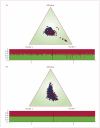A genome-wide genotyping study in patients with ischaemic stroke: initial analysis and data release
- PMID: 17434096
- PMCID: PMC2613843
- DOI: 10.1016/S1474-4422(07)70081-9
A genome-wide genotyping study in patients with ischaemic stroke: initial analysis and data release
Abstract
Background: Despite evidence of a genetic role in stroke, the identification of common genetic risk factors for this devastating disorder remains problematic. We aimed to identify any common genetic variability exerting a moderate to large effect on risk of ischaemic stroke, and to generate publicly available genome-wide genotype data to facilitate others doing the same.
Methods: We applied a genome-wide high-density single-nucleotide-polymorphism (SNP) genotyping approach to a cohort of samples with and without ischaemic stroke (n=278 and 275, respectively), and did an association analysis adjusted for known confounders in a final cohort of 249 cases and 268 controls. More than 400,000 unique SNPs were assayed.
Findings: We produced more than 200 million genotypes in 553 unique participants. The raw genotypes of all the controls have been posted publicly in a previous study of Parkinson's disease. From this effort, results of genotype and allele association tests have been publicly posted for 88% of stroke patients who provided proper consent for public release. Preliminary analysis of these data did not reveal any single locus conferring a large effect on risk for ischaemic stroke.
Interpretation: The data generated here comprise the first phase of a genome-wide association analysis in patients with stroke. Release of phase I results generated in these publicly available samples from each consenting individual makes this dataset a valuable resource for data-mining and augmentation.
Figures

Comment in
-
In search of genes for stroke.Lancet Neurol. 2007 May;6(5):383-4. doi: 10.1016/S1474-4422(07)70088-1. Lancet Neurol. 2007. PMID: 17434084 No abstract available.
References
-
- Bonita R. Epidemiology of stroke. Lancet. 1992;339:342–44. - PubMed
-
- Rothwell PM, Coull AJ, Giles MF, et al. Change in stroke incidence, mortality, case-fatality, severity, and risk factors in Oxfordshire, UK from 1981 to 2004 (Oxford Vascular Study) Lancet. 2004;363:1925–33. - PubMed
-
- Brown RD, Whisnant JP, Sicks JD, O’Fallon WM, Wiebers DO. Stroke incidence, prevalence, and survival: secular trends in Rochester, Minnesota, through 1989. Stroke. 1996;27:373–80. - PubMed
-
- Hassan A, Markus HS. Genetics and ischaemic stroke. Brain. 2000;123:1784–812. - PubMed
-
- Joutel A, Corpechot C, Ducros A, et al. Notch3 mutations in CADASIL, a hereditary adult-onset condition causing stroke and dementia. Nature. 1996;383:707–10. - PubMed
Publication types
MeSH terms
Grants and funding
LinkOut - more resources
Full Text Sources
Other Literature Sources
Medical
Molecular Biology Databases
Research Materials

